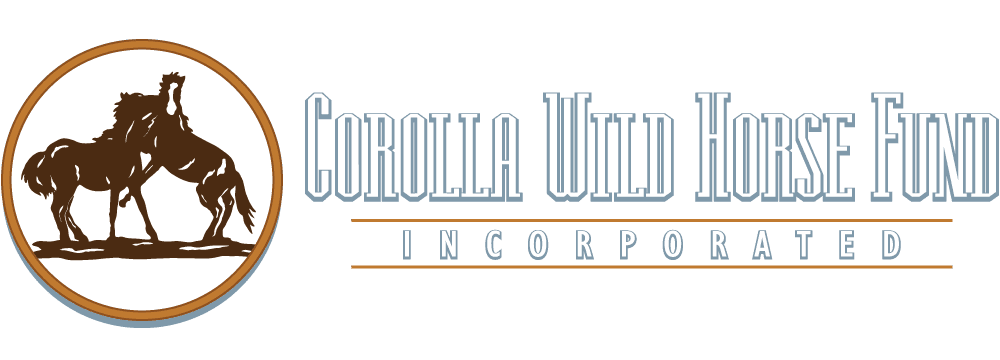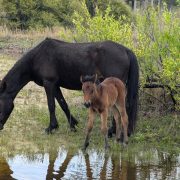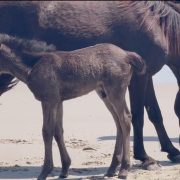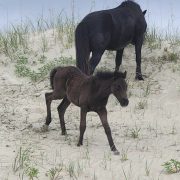Well, we had another exciting morning. Let us preface all of this by saying the ladder is no longer around her neck and the mare and foal are both completely fine.
At about 10:30 this morning we received a call that there was a horse with a ladder around her neck. Three of our staff were very close by and found her immediately (she was pretty hard to miss), and several residents had also seen her and came to help. At first we thought maybe if she dropped her head down the ladder would slide off, but every time it hit the back of her ears she would understandably fling her head back up. Luckily she wasn’t all that bothered by it so at least we didn’t have to worry about her panicking and hurting herself or her foal. One of the characteristics of this breed is that they are very level-headed and not reactionary, and this mare was a good example of that today.
We spent about an hour trying to get her into a position where we could get close enough to pull it off but didn’t have any luck with that plan – she was too fast and there is just too much wide open space (this was one of the few times when that is a bad thing!). But we got lucky when she dropped her head to graze at one point and the ladder slipped down over one ear. We all held our breath and thank goodness it fell the rest of the way off. Everyone in the surrounding houses who had been watching from their decks cheered, and so did we. The ladder was retrieved and both the mare and the foal are just fine.
Just another day at the office.  Sharing here on social media so that hopefully everyone who watched this happen in real time sees the update and can rest assured that all’s well that ends well. If you’ve seen pictures of this posted on other pages or groups, please share the link to this post so that people do not continue to worry!
Sharing here on social media so that hopefully everyone who watched this happen in real time sees the update and can rest assured that all’s well that ends well. If you’ve seen pictures of this posted on other pages or groups, please share the link to this post so that people do not continue to worry!
We’d also like to thank our community for once again jumping in to help when needed. We didn’t even have to ask – you were there and ready to do whatever was necessary to help this horse and we are so grateful. Knowing that we can always count on you makes these very stressful situations a little less stressful.
If you witness a horse in danger or distress please call 252-453-3633. They will immediately notify CWHF and can also dispatch law enforcement if necessary.
Introducing Folly
/by Corolla Wild Horse FundIt is a dreary day here in northeastern North Carolina so we figured we’d brighten things up a little by announcing the birth of a second wild Banker foal! This filly was born on April 1 and both she and her dam are doing great. Her name is Folly.
We have been closely monitoring Folly and her dam for the last 10 days. Our vet has been consulted to make sure all seems well and we have already started a file for her in our records so that we can upload photos to keep track of her growth and development. But we try to give every foal at least a week if not longer before making any announcements about them so that they have time to bond with their families and become a little less fragile before being in the public spotlight.
This is especially important for the foals born early in the spring – winter can be taxing on the horses in general, and it can be especially difficult for a mare who was heavily pregnant during the coldest time of the year, goes through the physical trauma of giving birth, and then has to sustain a growing foal before all of the spring and summer vegetation has fully grown in. Foals can consume up to 25% of their body weight in milk every day and gain between 1-3 pounds daily. That’s a lot of calories they need from their mom! We don’t want to make it any harder on them by attracting too much attention in the first few days of the foal’s life.
Thank you for respecting the horses’ space if you are lucky enough to catch a glimpse of these newest additions. It’s an exciting time of year on the northern beaches but please also remember that mares and foals are especially vulnerable and need to be given lots of room right now.
Riptide Goes to Raleigh!
/by Corolla Wild Horse FundRiptide was in Raleigh and it was historic day for the Corolla Bankers!
The Corolla Wild Horse Fund was invited by the North Carolina General Assembly, on behalf of Senator Bobby Hanig and Representative Ed Goodwin, to visit the state capitol in Raleigh to raise awareness about the Corolla Bankers and the work we are doing to preserve their wild habitat and promote conservation of this endangered breed. Riptide, who was formerly wild but rescued as a yearling due to a life-threatening infection, came along to serve as an ambassador for his breed and show representatives from across the state how very special these horses are.
This is the first time our state horse has set hoof on the grounds of the capitol!
We’d like to extend our sincere gratitude to Senator Hanig and Representative Goodwin for their recognition and support, and we are looking forward to continuing working together to advocate for these horses at the state level.
Good boy, Riptide. We are so proud of you.
Announcing the first foal of 2025
/by Corolla Wild Horse FundAnnouncing the first foal of 2025 – a filly we’ve named Finola. She was born on St Patrick’s Day weekend so we figured she needed a good Irish name.
We know that new foals are very exciting and everyone wants to catch a glimpse of them but we are once again reminding everyone to please give them plenty of space and privacy. If we could, we would avoid posting anything for as long as possible so as not to draw too much attention to them especially when they are brand, brand new but they do live among the public so that is not something we can control. Since word is already out about this little girl we are posting today as well so that we can remind everyone about how important it is to be respectful and not cause undue stress to the foal, the mother, or any of the other horses in the harem.
Thank you for helping us protect this endangered herd and every new foal that is born into it. Every single one of them is critical to the long-term survival of these horses in the wild and with your support we are doing all that we can to ensure they have a safe, healthy habitat in which they can thrive.
Welcome to the beach, Finola!
Remembering Raymond
/by Corolla Wild Horse FundOn the morning of Wednesday, October 30, we made the difficult but necessary decision to euthanize Raymond the mule due to a small scrotal hernia that occluded the affected loops of his small intestine.
We believe that Raymond was in his late 20s. He was the offspring of a wild Banker mare and a donkey that lived with the herd before there was a domestic livestock ordinance in place. He was actually Raymond Jr (or maybe even Raymond III) – his sire the donkey was the original Raymond. He was also known by locals as Jack, Rebel, Burrito, and probably a few other choice nicknames over the years.
Raymond spent most of his life in the wild and lived just like the horses – he had a harem of mares, raised foals (even though they weren’t biologically his – mules are sterile), and fought other stallions for territory. He had a reputation for being fierce, and most of the stallions gave him a wide berth. Because he was a hybrid, Raymond did not have all of the physical adaptations we see with the Banker horses and as a result had issues with his hooves throughout much of his life. When he was younger they would grow out and break off without any intervention, but as he got older and less active he was unable to self-trim. Late in 2017 we sedated Raymond and trimmed his feet in the field, which helped him for a while. But by the following year they had grown back out and he had become severely lame, so we made the decision to take him to the farm where we’d be able to provide him the care he needed.
We were a little worried that Raymond would have a hard time adapting to life on the farm, but he quickly showed us that we should never underestimate him. He settled right in and figured out how to wrap us around his hooves, and for the next five years our lives would revolve around him. We were able to correct many of the issues with his hooves and keep him sound and comfortable, he was put on a diet more appropriate for a mule his age, and he even agreed to being halter trained. We built him his own pasture where he didn’t have to worry about other horses challenging him (turns out he really wasn’t all that fierce, he was just very defensive) and we did our best to accommodate and indulge in all of his many quirks and idiosyncrasies. After we rescued Blossom last year she and Raymond lived together at the farm as they had in the wild, and they were both so happy to have each other’s company.
Our goal for Raymond, especially over the last year or so, was to keep him content and comfortable. We knew that should he become seriously ill there wasn’t much we could do for him due to his age, other underlying health issues, his temperament, and the fact that we could no longer safely anesthetize him. Quality of life was the most important part of his care plan, and he was definitely a very happy mule right up to the moment he passed away. It doesn’t make the loss any easier or less heartbreaking, but there is certainly a lot of comfort to be taken from that.
Finding the words that fully encapsulate Raymond’s extraordinary life and his place in our history is proving to be quite difficult. There will never be another one like him, and his death is the end of an era. He is the closing chapter on a way of life that does not exist here anymore. He was everything a Banker is supposed to be – resilient, adaptable, smart. He was truly the salt of the earth.
We will remember him fondly and miss him dearly. It’s way too quiet around here without him hollering at us.
Raymond touched so many lives and was adored by so many people. We’d like for you to help us write his eulogy by visiting this special page on our website that we’ve set up for him. Please share your memories, photographs, and condolences so that we can celebrate his life together: https://www.corollawildhorses.com/remembering-raymond…/
Rest well, Raymond.
Fatal Wild Horse Incident
/by Corolla Wild Horse FundAt 11:30pm on Friday, July 26 we received a 911 call that a horse who had been standing on the beach was struck by a vehicle. The incident was witnessed and reported by a visitor who had been surf fishing at the time. No other horses were injured. The driver of the vehicle was arrested.
The horse that was hit was 10-year-old stallion Bullwinkle, and the injuries he sustained were as follows:
-Significant skin trauma over the right side and back.
-Broken right hind leg with fracture of the lower femur.
-Left hind trauma and lateral destabilization of the hock with collateral ligament injuries, allowing the leg to bow outwards.
-Pendulous abdomen when standing and once euthanized fluid-filled abdomen confirmed with a fluid wave of manipulation, likely due to significant internal trauma and blood within the abdomen.
Bullwinkle’s injuries were severe and ultimately fatal. Our veterinarian arrived on the scene early Saturday morning to humanely euthanize him.
On Thursday, we posted a video of two stallions fighting and told the story of how the challenging stallion had been vying for the other stallion’s mares for several weeks. The challenging stallion was Bullwinkle. He was in the prime of his life, and went from being a symbol of what it means to be wild and free to a tragic example of how irresponsible, reckless human behavior can cause pain, suffering, and irreparable damage to the herd in an instant. Bullwinkle will never produce any foals. His genetics are gone from the herd forever and with such a small, endangered population the ramifications of that will last for generations.
Bullwinkle died as wild as he lived; at no point did he welcome our intervention and he remained wary and defensive even as he laid on the dune unable to stand anymore. The fight drive that he was always known for never left him, right up to the end. He was exactly what a wild Banker stallion is supposed to be, and we are glad that he at least never had to leave the beach – he was never meant to. He was buried at the edge of the meadow where the video from Thursday was filmed. There is not much comfort that can be found in anything about this tragic incident, but we are at least grateful that we could help him pass without further suffering and provide him with the respectful and dignified burial he deserved.
We’d like to thank everyone who helped us Friday night and Saturday morning, especially the visitor who called 911. Otherwise there would have been no consequences for the driver, we would have never known what happened, and Bullwinkle may have suffered for longer than he did. Thank you to our community who came together to help us that night and into the day on Saturday, to the Currituck County sheriff’s department for their quick response and on-going support, and to our staff and veterinarian for their unending dedication to always doing what’s best for the horses.
Elvis has arrived!
/by Corolla Wild Horse FundIf you’ve been following us for a while you probably remember hearing about Alma, the young mare who was ostracized from her harem when she was two years old. She was a little lost for a while, but eventually found a group that accepted her.
We are very excited to announce today that Alma had her first foal! She is currently with the harem that Eowyn is a part of, which is great. It’s always nice when foals can grow up with each other. We hope that Alma stays with this harem – they are very stable, and the stallion is very protective. Alma is being a good mom and her colt, who we’ve named Elvis, is perfect! He was most likely born Sunday night or Monday.
We are so glad that we did not intervene and remove Alma from the wild when she was struggling to find her place in the herd. It was difficult for people to watch, but we knew that in the grand scheme of things she was safe and just needed a little more time to mature and figure things out. These situations are often beyond the scope of our control and sometimes you just have to trust that nature will work out like it should, one way or the other. In this case, it seems to have worked out for the best and we are very excited to welcome Alma’s first foal to the herd.
New foals are very exciting, especially when they are out on the beach, but please do not let your excitement get in the way of following the rules. They are in place to keep you and the horses safe. Remember to give them plenty of space – 50ft at minimum. If you’re wondering if you’re too close, you probably are. Always err on the side of caution and help us make sure Elvis, Eowyn, Ezra, and Eros have a long, bright, WILD future ahead of them!
It’s a Girl!
/by Corolla Wild Horse Fund This is the foal we first saw a couple weeks ago but were unable to determine the sex of. Today we confirmed it is indeed a filly.
Her mother’s name is Arwen and the stallion they’re with (most likely the sire but only DNA will tell for sure) is named Rohan. So since it’s an E year we of course had to go with the name Eowyn for this filly. Someone on staff is kind of a big Lord of the Rings fan. 
 And literally translated, Eowyn (pronounced ay•uh•wn) means “joy from horses” in Old English.
And literally translated, Eowyn (pronounced ay•uh•wn) means “joy from horses” in Old English.
Please remember to give the horses plenty of space at all times – especially the foals. They are very fragile, impressionable, and unpredictable. Parents can also become aggressive and protective if they feel threatened. Help us ensure that Eowyn and the rest of this years foals grow up healthy, safe, wild, and free.
Hello, Ezra!
/by Corolla Wild Horse FundJoin us in welcoming the newest member of the herd, a colt named Ezra. He was born about a week ago to a very experienced mother and both are in excellent condition. All of this mare’s other foals have been black with no markings so we were excited to see that this little guy was not only chestnut, but also has a star on his forehead. Color and markings make absolutely no difference to the horses, but they sure make it easier for us to identify them when they’re older. 
If you are lucky enough to catch a glimpse of the family, please remember to stay at least 50ft away from them at all times regardless of whether you’re on foot or in a vehicle. Crowding them can cause unnecessary stress and can also habituate the foal during this very critical stage of his development. Causing a traffic jam around the horses is dangerous for them, other drivers, and pedestrians – please be sensible, respectful, and law-abiding if you are driving on the beach this spring and summer.
Ezra is the third foal born in 2024. The first was Eros, a colt born in February, and there is one other foal that we estimate to be about a month old. We have not yet been able to determine if it’s a colt or a filly. That group lives primarily in the marsh and we do not see them often, but they did bring the foal out to the beach very briefly one afternoon a couple weeks ago. Mom and foal both look healthy, which is the most important thing!
Raymond has a companion, again.
/by Corolla Wild Horse FundBlossom, who was rescued in October after tearing a ligament in her front leg, has been doing really well. Her latest check-up indicated that the leg has healed and fused as much as it’s going to, and all things considered, she is remarkably sound. Since this coincided with Junior coming home from the hospital and needing the medical stall/paddock we started considering other living arrangements for her.
We knew that Blossom and Raymond had lived together in the wild, and since they’re about the same age, in about the same physical shape, and have the same dietary requirements we thought…it’s worth a try, right?
Raymond, despite his reputation, is pretty defensive and uncomfortable around other animals, and very sensitive to changes in his environment and routine. In the five years he’s lived with us we’ve never been able to find another animal he was happy sharing space with; he stops eating and gets very touchy and unhappy. Raymond’s paddock can be split in half, so we closed the gate and put Blossom on the other side so they could be next to each other but still separated by a fence. That went pretty smoothly. Raymond hid from her to begin with, but then got brave and came out to stand next to her at the gate. However, by the next day we noticed that Raymond had stopped eating. At first we thought it was because of Blossom but then we realized it was because we’d moved his hay from its regular spot. So after we fixed that, he went back to eating like normal. Have we mentioned how neurotic he is?
After about a week of everyone behaving normally and seemingly comfortable with things, we took a deep breath and opened the gate. Because they are both very old and not in the best physical shape the theatrics were kept to a minimum. They made a few faces at each other, pretended to kick out a few times, and that was it. They settled in and started eating hay next to each other and the rest is history!
They both still seem very happy after a couple weeks of cohabitating. Blossom likes having someone to boss around and Raymond enjoys feeling like he’s in charge of something again. It’s been a great confidence boost for him. They definitely still keep to their own space a lot of the time, but we’ve caught them napping together and eating out of the same pile of hay a few times too.
We’re so glad that these two could be successfully reunited. It’s great for their emotional well-being and it makes husbandry a bit easier for us. The other option we were considering for Blossom was putting her with her daughter June, but if we fed June the type and amount of hay her mother needs she would explode! So this works out best for everyone. We’ve dubbed their little pasture the old folks home, and we know everyone will be looking forward to seeing them in person at open houses this summer. They sure are cute together!
Blossom and Raymond both require special care in their old age, and you can help offset the cost of that by sponsoring them. Your support helps us buy the hay, grain, and daily meds they need, provide specialized hoof trimming, and any other veterinary needs that arise.
Sponsor Raymond or Blossom (or both!): https://www.corollawildhorses.com/horse-sponsorships/
Corolla Wild Horse Fund
1130E Corolla Village Road
Corolla, NC 27927
(252) 453-8002
MUSEUM & GIFT SHOP
OPEN:
Monday – Friday
9:00 AM – 3:00 PM
PAGES
CONNECT WITH US
SIGN UP FOR OUR NEWSLETTER
Get the latest updates on the Banker horses and our work to protect and preserve them










